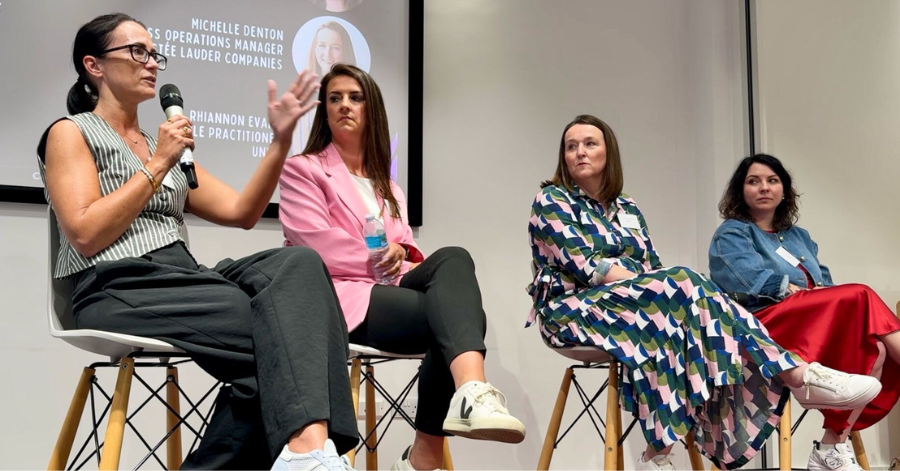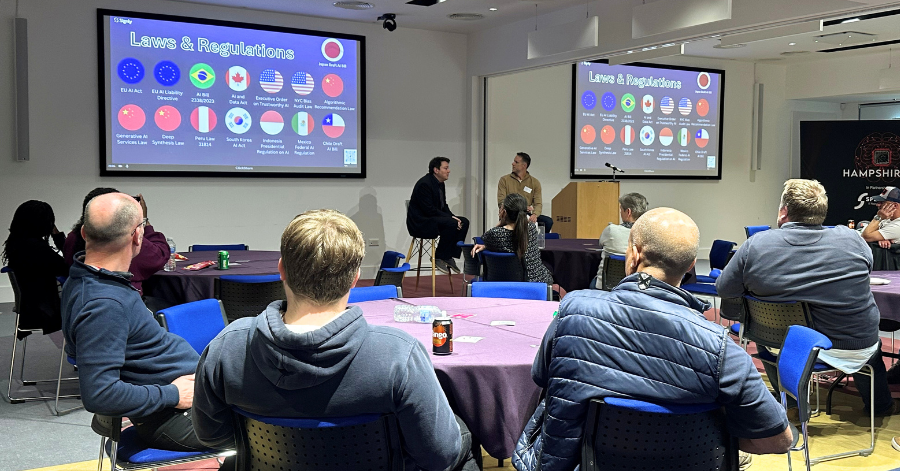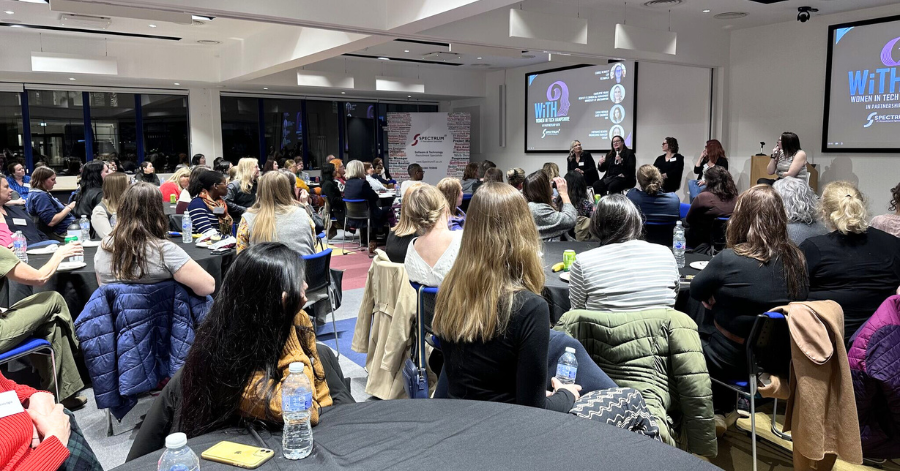Women in Tech Hampshire - 1 Year Celebratory Event
30 Jan, 202510 Minutes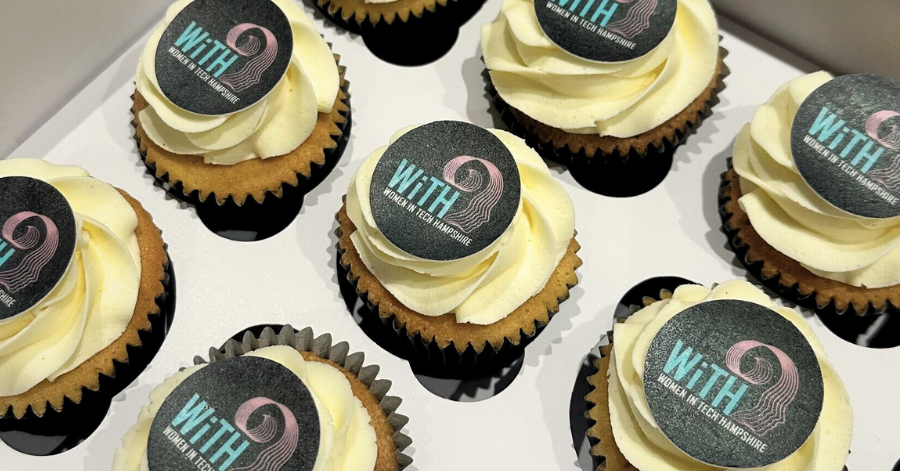
Women in Tech Hampshire’s 1-year anniversary event is a huge success!
As we head into 2025, we hosted our first meet-up of the year for the Women in Tech Hampshire (WiTH) network – while also celebrating our one-year anniversary! Our January event followed a different format to our previous meetings, to give attendees more time to network, get to know each other and learn from our experts. An initial inspiring talk gave way into a more fluid experience, with attendees and speakers moving around the room to engage in discussion on a variety of topics that impact women in tech.
We were privileged to host some incredible women working in tech at a high level. Claire Brydon, Senior Cloud Solution Architect at Microsoft, opened the event with a talk about the history of IT and what it’s possible to achieve over a career. She then moved around the room to talk with the attendees on a more personal basis.
Joining Claire in the room, was Emma Woollon, Technology Director at Serco; Emma Dawson, Senior Inventor and Technology Engineer at IBM; and Sam Gaskell, Consulting Director and Founder of DataFit. Donna Wayman, COO at Zurich Legacy Solutions, and Becky Lodge, Director of Little Kanga Ltd and StartUp Disruptors, were both unable to attend due to illness, but have kindly provided their insights on the discussion topics.
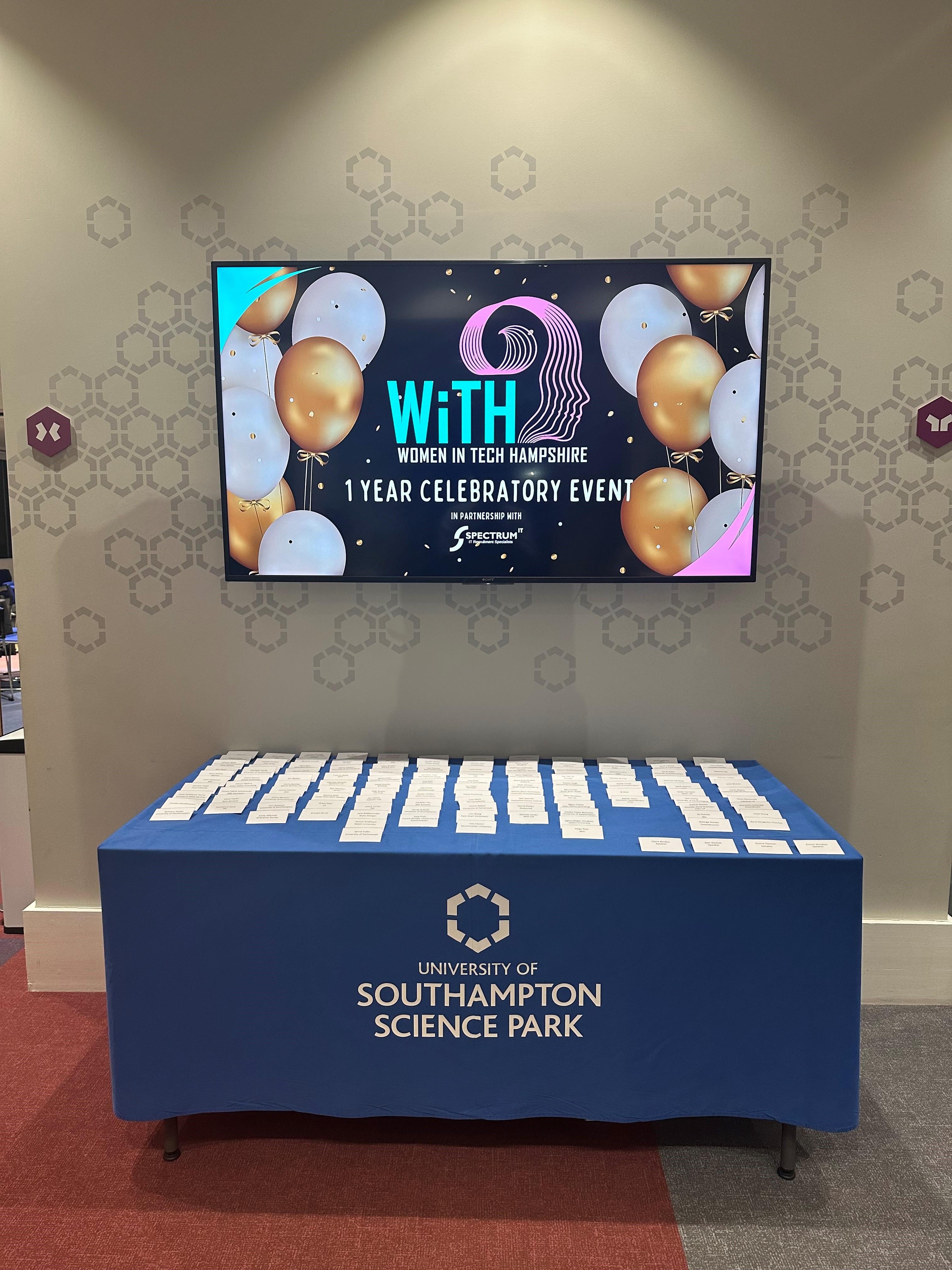
Opening talk
With more than 70 likeminded attendees present, the anniversary event kicked off with an interesting and informative presentation from Claire, looking at both the history of IT and how her career has developed around that.
Claire has worked her way through support engineer roles, to design and then to architecture over an impressive 28 years. She’s seen the development and evolution of the IT industry firsthand, beginning with studying for a HND in Computer Science at Sheffield Hallam University and her first graduate job in the late 1990s. The Nineties was a time of vast change; NCSA Mosaic was released in 1993 as one of the first widely available web browsers, introducing the internet and World Wide Web to more people.
Claire talked about how the turn of the millennium started an era in which tech became a real part of our culture. This was the decade that saw Yahoo, eBay, Google, Facebook, Hotmail, Amazon, Etsy, LinkedIn… and so much more. It was also when UK homes had useable broadband, and the iPhone was launched. It was a pivotal point in time that changed the IT industry both for those who worked within it and the end users.
After that initial explosion of technology, things slowed down in the 2010s, though there were still plenty of advancements. At this time, Claire took a career break – in 2016 she quit her job as an Infrastructure Architect at Barclays, sold everything she owned and went to live in Hawaii. This didn’t discourage her or slow down her career trajectory, contracting with Metro Bank as a Solution Architect, before landing her current role at Microsoft.
She describes her imposter syndrome over working at Microsoft – something that many women in tech can identify with at any stage of their career – but she encouraged us to think about what we can achieve in our careers over time. Claire shared a quote from Bill Gates, saying, “Most people overestimate what they can achieve in one year and underestimate what they can achieve in 10 years”. She then threw the conversation open, encouraging everyone present to consider what they hope to achieve in the next ten years.
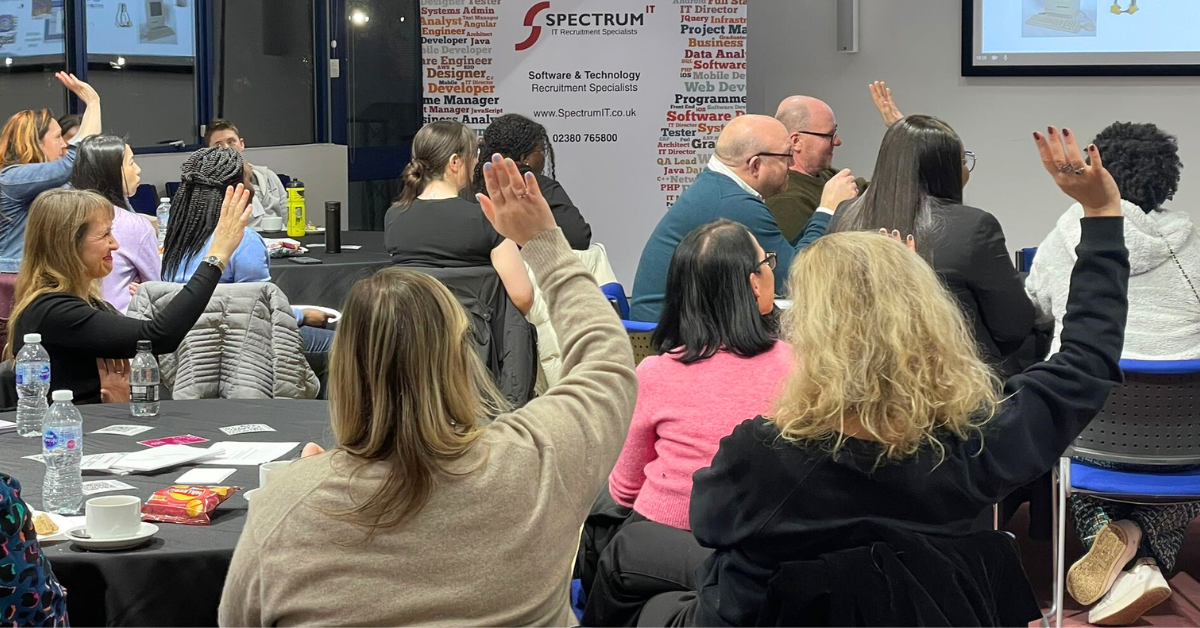
Discussion topics and insights
With the mood set and everyone buzzing with ideas, it was time to move out into the room. On the tables we had set out discussion suggestions to help encourage conversation, including Imposter Syndrome, DE&I Policies, Male and Female Allies, Career Change/Progression and Positive Discrimination.
Claire had already shared her own experiences of imposter syndrome, but it’s a common feeling among women in tech. Emma Dawson said that imposter syndrome was one of the biggest topics across the tables that she sat in on, which led to encouraging discussions on ways to overcome it. Donna says: “We are mostly our own worst enemies and the things we think are generally not what others think”. She encourages women to, “try and reframe negative thoughts into positive ones” even if it feels uncomfortable at first. Becky has written a useful article on imposter syndrome, where she shares her own story and experiences with gender parity, and how this can feed into imposter syndrome. “Ultimately, whatever women achieve, we have been conditioned to question that we have done it well enough, as we have been told to always seek external approval and validation,” she writes. One of the main themes of the evening, according to Emma Woollon, was around this sense of self-acceptance and being unapologetic about who you are and what you can do.
This leads in well to the topic of career change and progression, and how and when to make that next step. Donna suggests not underestimating moving into a sideways role to build up a career, as this can help to fill out skillsets that you might be missing for future roles. Emma Dawson also recounted discussions at the table around looking for opportunities in hobbies outside of work to help continue to grow skills.
Emma Woollon praised the many achievements of women in the room as she spoke to the attendees. Some of the conversations centred around the benefits of coaching to help with career progression, or to move a business forward, as well as continuous personal development. She also heard some amazing stories of women who had made changes in their career, including one attendee who had set up a new business off the back of meeting someone at a previous WiTH event!
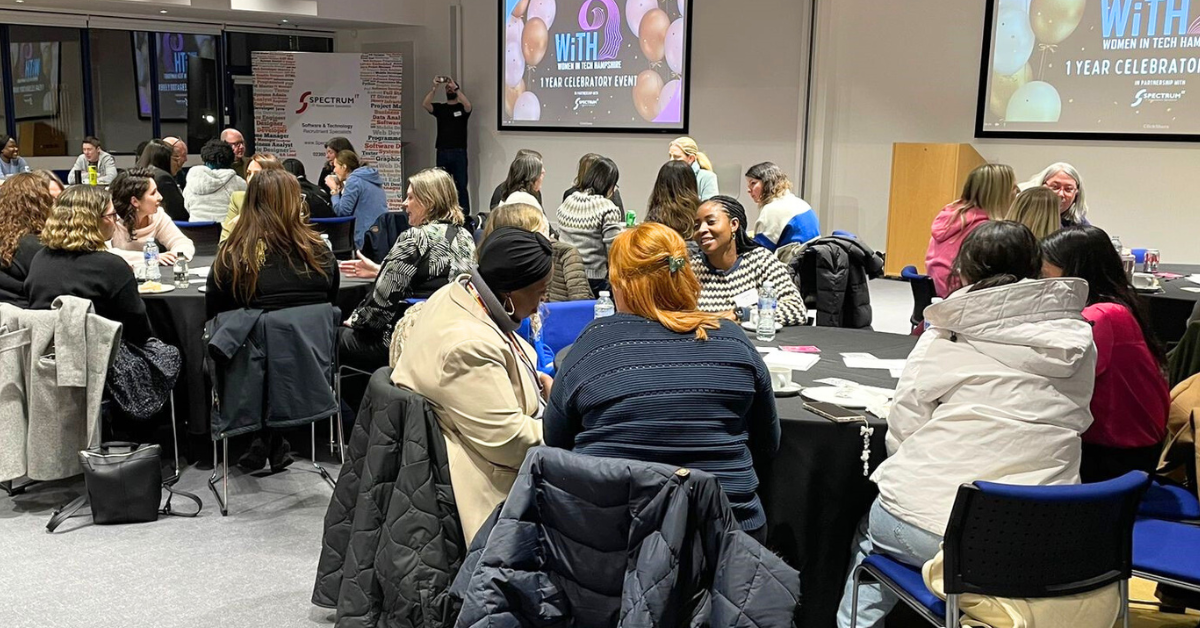
Many of the women present talked about positive discrimination in the workplace, and how this can feed into imposter syndrome. Donna says: “Don’t be afraid to speak up if you feel this is the case; there are usually good mechanisms to do this. Educate yourself and recognise the difference between ‘positive actions’, which are helpful and measured, vs ‘positive discrimination’.” However, some women expressed that they’d never been subject to “feeling like a woman” in tech and had always been included – which is a great thing to hear!
One of the other discussion topics was about the importance of male and female allies. Becky says: “With regard to allies, my advice is to find the people who are willing to advocate for you. This could include peers as informal mentors. Also, ask early on in your career to work shadow someone with no expectation of monetary gain if they have a set of skills that you are seeking to develop.” Sam has previously said that it’s important for men to support women in their workplace and create a safe space in which women can take risks: “Allow women to give themselves credit and provide a platform for them to be proud of what they achieve.” Emma Woollon reflected after the event on how good it was to have allies in the room while these conversations were taking place.
Finally, a big topic was around DE&I policies in the workplace, which included conversations around hiring for the right reasons and to build a diverse mindset; mentoring other women in tech and going into schools to encourage the next generation; and considering diverse hours to align with being productive, particularly for those who are neurodivergent. For Sam, being role models for school-age girls is an important area when it comes to attracting women into tech. When she joined us at a previous WiTH event, she talked about taking part in the social enterprise Next Tech Girls and workplace programs to encourage women into STEM subjects.
We’ve only covered a small taste of the many in-depth conversations from the evening, but encourage you to see the feedback on our LinkedIn Group for more insight into the event.
Feedback from the event
The whole evening was inspiring and uplifting. It was incredible to hear so many great stories from the community about their careers, achievements and goals. Many of the women present are working in male-dominated teams, and events like this can help them to widen their network. And for the men at the event, it was a chance to discuss issues that impact women and how to drive change, inclusion, diversity and opportunity.
From our post-event survey, people really liked the switch up of the event format, the warm welcome, and the chance to learn, develop and grow.
“It's a very thriving community, and I love to hear the stories shared by successful women, as well as being part of conversations that inspire others.”
“It was my first event. Loved the round tables with the speakers attending each table. It was a wonderful opportunity to speak to them directly. The round tables ensured a diverse mix of people to network with. It would be great to continue this in the future.”
Being able to network with a specific focus on women in tech was also a key positive:
“It is a fantastic chance to meet people outside of my rather narrow team of men and talk about the issues that affect us (and not football!)”.
“[A] key topic for [the] engineering industry is to increase the female headcount. With this in mind, its’ good to hear female perspectives on how they can be better supported in the workplace. Also lovely to mix with some very inspiring women and learning from success stories.”
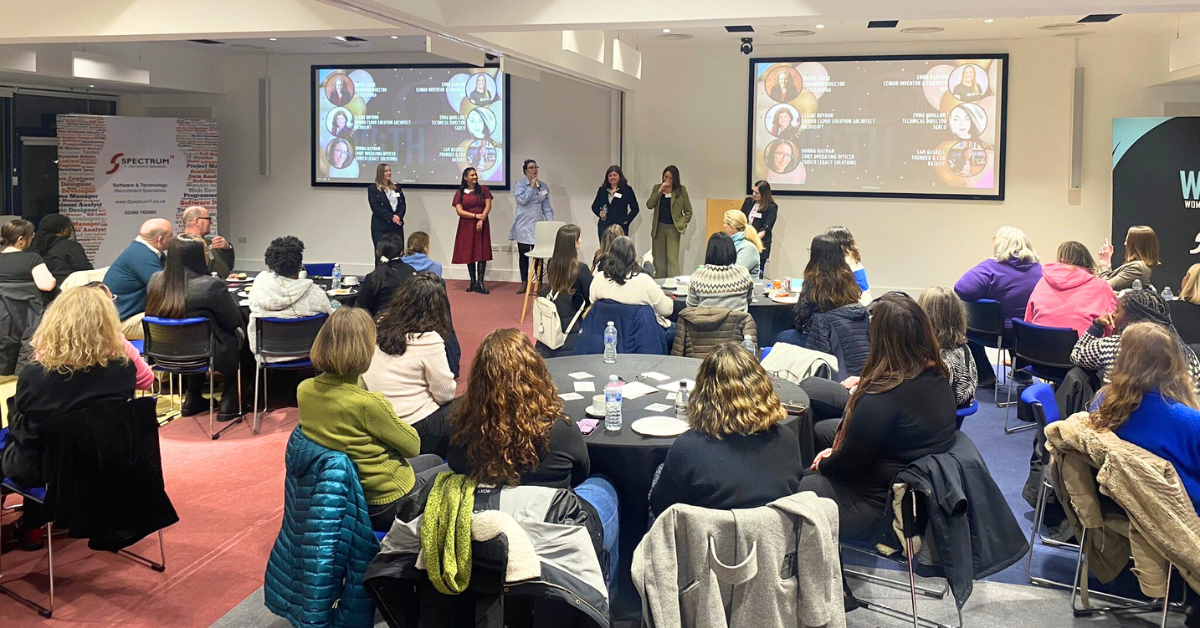
We always take your feedback on board, and both Amy and Lauren are passionate about the future of WiTH and the opportunities to evolve and develop it further. Our next event will be in March; check out our Women in Tech Hampshire LinkedIn page to find out more and book your space.



